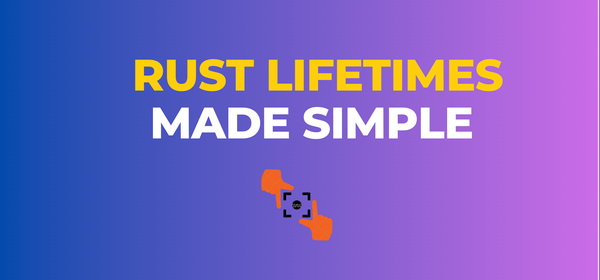Understanding Result, Option, and ‘?’ Operators in Rust
Hey there, fellow Rustacean! 🦀

Hey there, fellow Rustacean! 🦀
If you’ve dabbled in Rust, you’ve likely encountered Result, Option, and our mysterious friend, the ? operator. These aren't just random constructs; they're Rust's secret sauce for dealing with uncertainties and potential errors in a type-safe way.
Instead of the traditional exception-based error handling in many other languages, Rust offers a fresh (and some say, better) approach. Dive in with me as we unravel the magic of these tools and elevate your Rust game to the next level!
Ready? Let’s go! 🚀
1. Option
An Option is a Rust standard library type that represents an optional value. It can be either:
Some(T), whereTis the actual value.None, representing the absence of a value.
Usage:
fn find_name(id: u32) -> Option<String> {
if id == 1 {
Some("Alice".to_string())
} else {
None
}
}Here, if id is 1, the function returns the name "Alice", otherwise it returns None.
Common Methods:
is_some(): Returnstrueif the option is aSomevalue.is_none(): Returnstrueif the option is aNonevalue.unwrap(): Returns the value insideSomeor panics if it'sNone.unwrap_or(default): Returns the value insideSomeor the default if it'sNone.
2. Result
A Result is another type from the Rust standard library that can have one of two outcomes:
Ok(T): Represents a successful result containing a value of typeT.Err(E): Represents an error with an error value of typeE.
Usage:
fn divide(numerator: f64, denominator: f64) -> Result<f64, String> {
if denominator == 0.0 {
Err("Division by zero.".to_string())
} else {
Ok(numerator / denominator)
}
}Here, if the denominator is zero, the function returns an error. Otherwise, it returns the result of the division.
Common Methods:
is_ok(): Returnstrueif the result isOk.is_err(): Returnstrueif the result isErr.unwrap(): Returns the value insideOkor panics if it'sErr.unwrap_err(): Returns the error insideError panics if it'sOk.
3. The ? Operator
Rust provides the ? operator to make error propagation more concise. When you call a function that returns a Result (or Option), instead of handling the potential error right there, you can propagate the error up the call stack using ?.
Usage:
Without ?:
fn foo() -> Result<i32, String> {
let res = some_function();
match res {
Ok(val) => Ok(val * 2),
Err(e) => Err(e),
}
}With ?:
fn foo() -> Result<i32, String> {
let val = some_function()?;
Ok(val * 2)
}The ? operator, when applied to an Ok value, unwraps it, and when applied to an Err, returns early from the function with that error.
Note: The return type of the function using ? must be a Result or Option. For Option, the ? operator works similarly, either unwrapping the Some value or returning early with None.
4. Composing Option and Result
In real-world scenarios, it’s not uncommon to deal with functions that return both Option and Result. For smoother interaction between the two, you can use:
Option::ok_or(err): Converts anOptionto aResult, using the provided error value if the option isNone.Result::ok(): Converts aResultto anOption, discarding the error value.
5. Using map and and_then for Transformation
Both Option and Result come with a rich set of combinators that help transform, combine, and manipulate these types.
map:
The map method allows you to apply a function to the Some or Ok value inside an Option or Result.
let x = Some(2);
let y = x.map(|v| v * 2);
assert_eq!(y, Some(4));For Result:
let res: Result<i32, String> = Ok(2);
let y = res.map(|v| v * 2);
assert_eq!(y, Ok(4));and_then:
While map applies a function that returns a plain value, and_then lets you apply a function that returns another Option or Result.
fn square_root(num: f64) -> Option<f64> {
if num < 0.0 {
None
} else {
Some(num.sqrt())
}
}
let x = Some(4.0);
let y = x.and_then(square_root);
assert_eq!(y, Some(2.0));For Result:
fn divide(a: f64, b: f64) -> Result<f64, String> {
if b == 0.0 {
Err("Division by zero.".to_string())
} else {
Ok(a / b)
}
}
let res = Ok(10.0).and_then(|num| divide(num, 2.0));
assert_eq!(res, Ok(5.0));6. Error Handling Patterns
Rust’s Result type, combined with the ? operator, offers a neat way to implement common error-handling patterns:
Early Returns:
By using the ? operator, you can return early in case of errors, making your code much cleaner than the traditional nested match or if-let constructs.
fn complex_function() -> Result<(), String> {
step1()?;
step2()?;
step3()?;
Ok(())
}If any steps fail, the function will immediately return with the error.
Error Wrapping:
Sometimes, you might want to provide additional context when an error occurs. The map_err method can be used to transform the error value of a Result.
let res: Result<i32, String> = Err("some error".to_string());
let wrapped = res.map_err(|e| format!("While doing X, encountered: {}", e));7. Chaining
The combinators provided by Option and Result allow for elegant chaining, making transformations and error handling concise.
let result = Some(2)
.map(|x| x * 2)
.and_then(|x| if x > 3 { Some(x) } else { None })
.map(|x| x + 1);
assert_eq!(result, Some(5));8. Converting Between Option and Result
There are situations where you might need to interchange between Option and Result. Rust provides methods for these conversions:
Option::ok_or and Option::ok_or_else:
These methods can convert an Option into a Result:
let name: Option<String> = Some("Alice".to_string());
let res: Result<String, &'static str> = name.ok_or("No name found");
assert_eq!(res, Ok("Alice".to_string()));
let absent: Option<String> = None;
let err_res: Result<String, &'static str> = absent.ok_or("No name found");
assert_eq!(err_res, Err("No name found"));Result::ok:
This method transforms a Result into an Option, discarding the error:
let good: Result<i32, String> = Ok(42);
let opt_good: Option<i32> = good.ok();
assert_eq!(opt_good, Some(42));
let bad: Result<i32, String> = Err("Oops".to_string());
let opt_bad: Option<i32> = bad.ok();
assert_eq!(opt_bad, None);9. Avoiding Unwraps
Although unwrap is a convenient method to extract the value from Option or Result, it can cause your program to panic if it encounters a None or Err. In production code, you should avoid unwrapping and instead handle potential errors gracefully:
- Use
unwrap_ororunwrap_or_elseto provide default values. - Use
matchorif letconstructs to explicitly handle both cases. - Propagate errors using the
?operator to let the caller handle them.
10. Working with Multiple Results using Iterators
When working with a collection of Result values, the iterator methods can be invaluable:
collect:
Combine iterator of Result values into a single Result of a collection:
let values = vec![Ok(1), Ok(2), Ok(3)];
let combined: Result<Vec<_>, String> = values.into_iter().collect();
assert_eq!(combined, Ok(vec![1, 2, 3]));all and any:
Determine if all or any elements of an iterator are Ok or satisfy a condition:
let values = vec![Ok(1), Ok(2), Err("error".to_string())];
let all_ok = values.iter().all(|&v| v.is_ok());
assert!(!all_ok);11. Leveraging the as_ref and as_mut Methods
Both Option and Result have the as_ref and as_mut methods, which are useful when you want to convert from Option<T> to Option<&T> or from Result<T, E> to Result<&T, &E>, respectively. This can be especially useful when you want to inspect the contents without consuming the original value.
let name: Option<String> = Some("Alice".to_string());
let name_ref: Option<&String> = name.as_ref();
assert_eq!(name_ref, Some(&"Alice".to_string()));12. Working with Arrays and Tuples
Rust provides convenient ways to work with arrays or tuples where you want to ensure all elements are Ok or Some.
Option::zip:
Combines two options into a single option of a tuple. It returns Some only if both options are Some.
let x = Some(1);
let y = Some("a");
let zipped = x.zip(y);
assert_eq!(zipped, Some((1, "a")));Result::transpose:
Swaps the nested types for Result and Option, turning an Option<Result<T, E>> into a Result<Option<T>, E>. This is especially useful when you want to normalize the order of types.
let matrix: Option<Result<i32, String>> = Some(Ok(3));
let transposed: Result<Option<i32>, String> = matrix.transpose();
assert_eq!(transposed, Ok(Some(3)));13. Practical Usage with the Filesystem
Many of Rust’s standard library functions return types, especially those dealing with IO or the filesystem. Here’s a practical example of reading a file’s contents:
use std::fs;
fn read_file(path: &str) -> Result<String, std::io::Error> {
fs::read_to_string(path)
}
fn main() {
match read_file("path/to/file.txt") {
Ok(contents) => println!("File contents: {}", contents),
Err(err) => eprintln!("Error reading the file: {}", err),
}
}In the example above, instead of panicking or crashing when encountering an error, we provide a graceful error message to the user.
14. Remembering the Philosophy
Rust’s approach to error handling with Option and Result is not just about the mechanics of the types and methods but also about a philosophy. It encourages developers to think about and handle errors and edge cases up front rather than deferring them, leading to more reliable and maintainable software.
Check out some interesting hands-on Rust articles:
🌟 Developing a Fully Functional API Gateway in Rust — Discover how to set up a robust and scalable gateway that stands as the frontline for your microservices.
🌟 Implementing a Network Traffic Analyzer — Ever wondered about the data packets zooming through your network? Unravel their mysteries with this deep dive into network analysis.
🌟 Building an Application Container in Rust — Join us in creating a lightweight, performant, and secure container from scratch! Docker’s got nothing on this. 😉
🌟 Crafting a Secure Server-to-Server Handshake with Rust & OpenSSL —
If you’ve been itching to give your servers a unique secret handshake that only they understand, you’ve come to the right place. Today, we’re venturing into the world of secure server-to-server handshakes, using the powerful combo of Rust and OpenSSL.
🌟Building a Function-as-a-Service (FaaS) in Rust: If you’ve been exploring cloud computing, you’ve likely come across FaaS platforms like AWS Lambda or Google Cloud Functions. In this article, we’ll be creating our own simple FaaS platform using Rust.
🌟 Rusting Up Your Own Self-Signed Certificate Generator — Let’s walk through the process of crafting your very own self-signed certificate generator, all using the versatile Rust programming language and the rust-openssl crate.
Read more articles about Rust in my Rust Programming Library!
From the humble Option to the mighty Result, and not forgetting the slick ? operator, we've journeyed through Rust's unique take on handling the "what-ifs" of coding.
Remember, it’s not just about mastering these tools, but embracing Rust’s philosophy of confronting uncertainties head-on.
So, the next time you’re deep in code and spot a potential hiccup, give a nod to the crabby Rust mascot and confidently tackle it.
Until our next Rusty adventure, happy coding and keep those gears turning! 🦀🔧🚀
Read more articles about Rust in my Rust Programming Library!
Visit my Blog for more articles, news, and software engineering stuff!
Follow me on Medium, LinkedIn, and Twitter.
All the best,
CTO | Tech Lead | Senior Software Engineer | Cloud Solutions Architect | Rust 🦀 | Golang | Java | ML AI & Statistics | Web3 & Blockchain



